If All The World’s Indeed A Stage, It Sure Explains The Nerves
The Bard was right – and interviewers are a tough crowd!

As someone who grew up performing on stage, I’m well acquainted with stage fright. While I’m no longer a performer, I feel the same nerves in more mundane situations like phoning the GP, ordering from a waiter or indeed, being mock-interviewed by my classmates. Throughout the mock-interview process, I used tips and tricks I’ve honed over years of battling this anxiety, as well as a few that were introduced to me through instruction and experience in this module.
This blog follows Schön’s model of reflection, chosen for its emphasis on learning by doing. Interviews require spur of the moment flexibility, and Schön’s model highlights reflection on this improvisational element1. I also reflected on the preparation I did prior to the interview session, which while not included in Schön’s model, is crucial for the process of any successful interview.
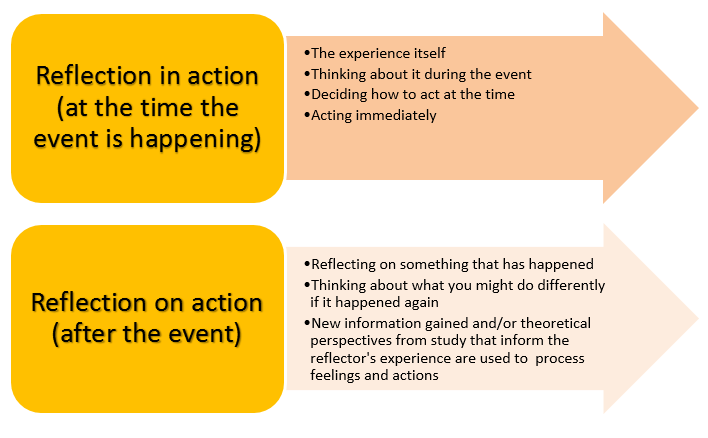
The Job – Casting Call
The job I found for a composing assistant at Can-Land Music was a rare and wonderful find, as jobs for composers are rarely advertised through normal avenues like Indeed. When reading the job listing I knew I had the skills required, past-experience with the exact scenarios they were advertising, and that I would fit well with the creative approach they took to music production. The only challenge was to convey that information with confidence in an interview scenario – easy enough right?

Preparation – Practicing Lines
Following our Career Advisor Emma Lennox’s presentation on interview questions, I analysed some of my past experiences with interviews and noted which questions caused me the most trouble. I focused on the dreaded “tell us about yourself” question, and using the suggested Past-Present-Future format I wrote a concise and descriptive response that I spoke through before the interview.
I also prepared for “tell us about a time when…” competency questions, as these often cause me to draw a complete blank. Scientists theorise that stressful situations like interviews can “impair our capacity for slow deliberation”2 providing insight into my inability to recall proper answers when questioned in this way.
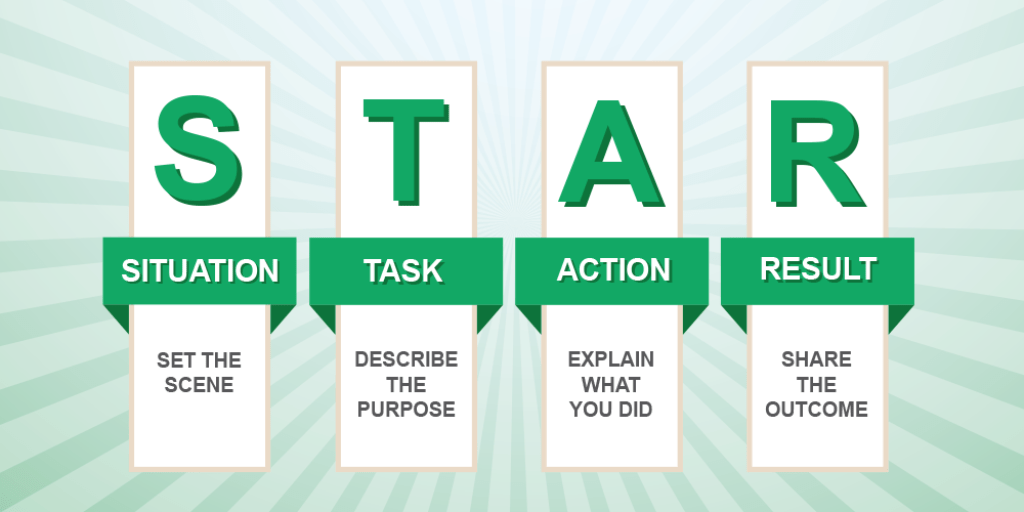
Knowing this, I came up with a few hypothetical responses and structured each according to the STAR technique. Though I had no idea what questions my cohort would ask, practising these responses in advance gave me a low-stakes exercise in coming up with well-structured examples on the spot3. I also reminded myself that panic responses like these can be combated by small actions like taking a breath4 and pausing before attempting to respond. With all these techniques and tricks practised, it was time to put them to work.
Reflecting In – Opening Night

Unfortunately, nerves are not so easily beaten, even with ample preparation. Standing outside the classroom with steadily mounting nerves, I fell back on one technique I’ve been using to calm down since high school: opening my body posture. Indeed’s own career website stresses the importance of positive body posturing, noting that physical presentation “has a significant impact on the interviewer and whether they offer a job”5. Keeping that in mind, I put my shoulders back, widened my stance, and worked to control my breathing.
Once I was called in and my classmates began the interview, I focused on retaining this relaxed physical presence. This sense of ease also helped me respond with good pacing and without falling prey to any nervous ticks I often realise I have done once the interview is over. During normal interviews, I usually avoid thinking about my answers as I speak them as that level of awareness often makes me stutter or take pauses that last too long. However, because mock interviews provide lower stakes, I felt like I could freely experiment with staying present while also devoting mental space to consider what I was saying and how I was saying it.
Reflecting On – Final Bows
I make a habit of setting my expectations low after interviews. This way, if I get the job I can celebrate, but if I don’t, I’m not steamrolled by rejection. Until I received the feedback forms from my peers, I was constantly critiquing my performance during the interview. That worry was assuaged though when I saw my classmates’ feedback. My breathing and stance practice paid off as my peers mentioned my “enthusiasm” and “positive body language”. While I didn’t make the conscious choice in the moment, they also mentioned my usage of STAR techniques in my responses, highlighting just how important pre-interview preparation can be.

My own impressions of how I interviewed were coloured by nerves and self-doubt, but my peers have no such hangups, and I believe their opinions following the mock-interview were genuine. After studying this feedback, I would like to improve my responses to technical questions in future interviews. I will strive to imbue these responses with the same level of confidence as the questions that revolve around my innate passions. Though my technological know-how is learned and not ingrained like my creativity, I am equally qualified to speak about both and should respond as such in interviews.
In Conclusion – And the Curtain Falls
Even though I know that this mock-interview holds no bearing on my future professional career, it provided invaluable insight into my areas of strength and areas that could further develop. As an anxious person, I’m always concerned with putting my best foot forward, especially where my career is concerned. Though it is no surprise, finding out that “anxious individuals are less likely to be hired”6 gives me even greater motivation to confidently approach job interviews, and this experience jump-started that process.
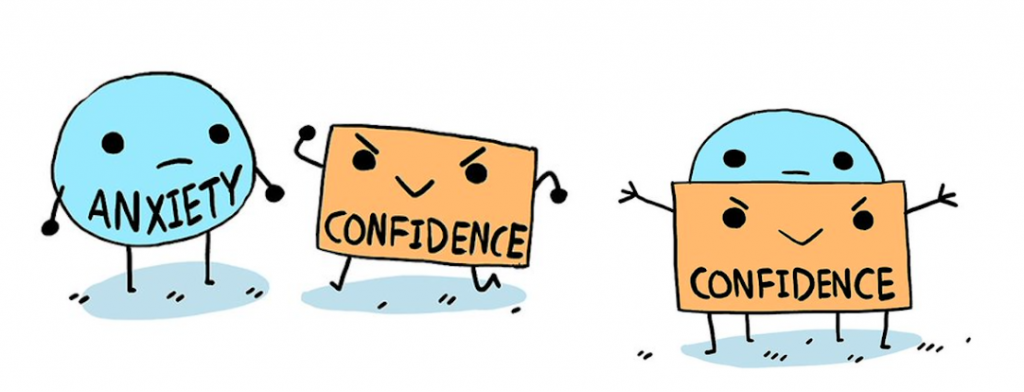
I already knew I had the technical experience and love for the jobs I’ll be applying to after graduation. Now it’s time to take a breath, and in spite of the stage fright, confidently step out to centre stage.
References
[1] Donald A. Schön, The Reflective Practitioner: How Professionals Think In Action, (London: Routledge, 1992), viii-ix.
[2] Erno J. Hermans et. al. “Stress-Related Noradrenergic Activity Prompts Large-Scale Neural Network Reconfiguration,” Science 334, no. 6059 (2011) 1151-1153.
[3] Michael Higgins, “Using the STAR Technique to Shine at Job Interviews: A How-To Guide,” The Guardian, 10 March 2014, https://www.theguardian.com/careers/careers-blog/star-technique-competency-based-interview.
[4] Harvard Medical School, “Relaxation Techniques: Breath Control Helps Quell Errant Stress Response,” Harvard Health Publishing, 6 July 2020, https://www.health.harvard.edu/mind-and-mood/relaxation-techniques-breath-control-helps-quell-errant-stress-response
[5] Indeed Editorial Team, “Body Language in an Interview: Importance and Tips,” Indeed, last modified 6 February 2023, https://uk.indeed.com/career-advice/interviewing/body-language-in-interview.
[6] Melissa J. Young, Ralph R. Behnke, and Yvonne M. Mann, “Anxiety Patterns in Employment Interviews, Communication Reports 17, no. 1 (2004): 49.
Bibliography
Harvard Medical School. “Relaxation Techniques: Breath Control Helps Quell Errant Stress Response.” Harvard Health Publishing. 6 July 2020. https://www.health.harvard.edu/mind-and-mood/relaxation-techniques-breath-control-helps-quell-errant-stress-response.
Hermans, Erno J. et al. “Stress-Related Noradrenergic Activity Prompts Large-Scale Neural Network Reconfiguration.” Science 334, no. 6059 (2011): 1151-1153.
Higgins, Michael. “Using the STAR Technique to Shine at Job Interviews: A How-To Guide.” The Guardian. 10 March 2014. https://www.theguardian.com/careers/careers-blog/star-technique-competency-based-interview.
Indeed Editorial Team. “Body Language in an Interview: Importance and Tips.” Indeed. last modified 6 February 2023. https://uk.indeed.com/career-advice/interviewing/body-language-in-interview
Schön, Donald A.. The Reflective Practitioner: How Professionals Think In Action. London: Routledge, 1992
Young, Melissa J., Ralph R. Behnke, and Yvonne M. Mann. “Anxiety Patterns in Employment Interviews.” Communication Reports 17, no. 1 (2004): 49.
Reflection of Simulated Interviews
You're Hired... I hope!
You May Also Like
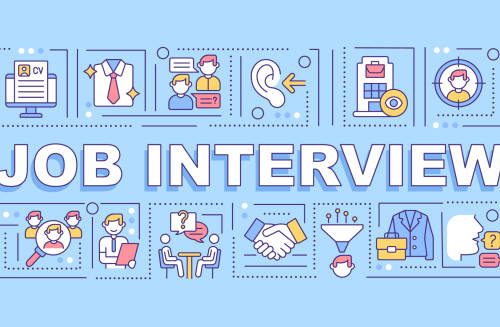
BE A S.T.A.R 🌟
14 February 2023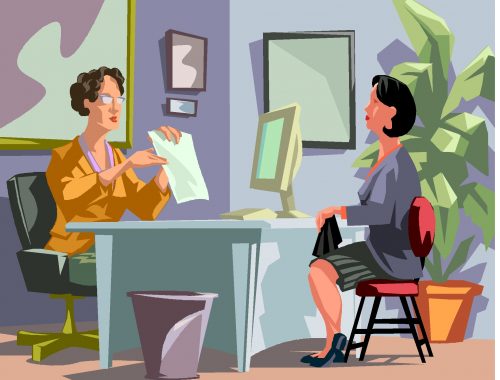
Interview a New You! – Becoming an Interview Guru
24 February 2023
